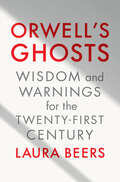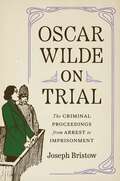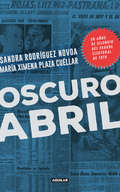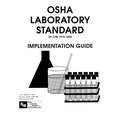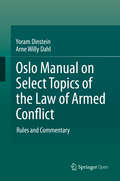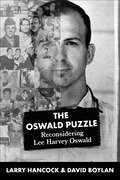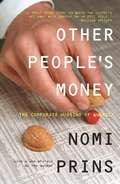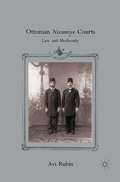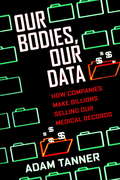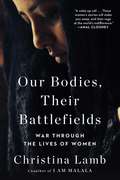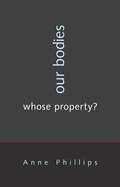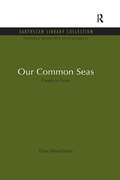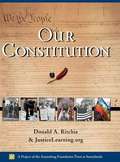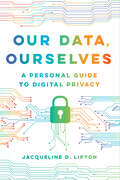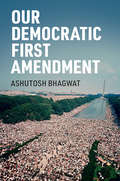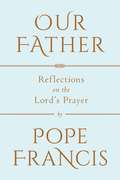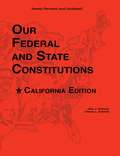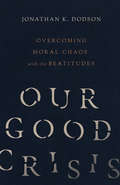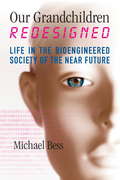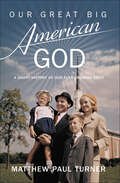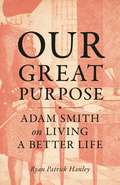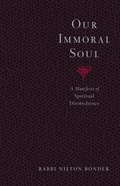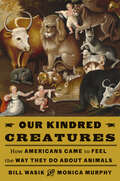- Table View
- List View
Orwell's Ghosts: Wisdom and Warnings for the Twenty-First Century
by Laura BeersFor the 75th anniversary of 1984, Laura Beers explores George Orwell’s still-radical ideas and why they are critical today. George Orwell dedicated his career to exposing social injustice and political duplicity, urging his readers to face hard truths about Western society and politics. Now, the uncanny parallels between the interwar era and our own—rising inequality, censorship, and challenges to traditional social hierarchies—make his writing even more of the moment. Invocations of Orwell and his classic dystopian novel 1984 have reached new heights, with both sides of the political spectrum embracing the rhetoric of Orwellianism. In Orwell’s Ghosts, historian Laura Beers considers Orwell’s full body of work—his six novels, three nonfiction works, and brilliant essays on politics, language, and the class system—to examine what “Orwellian” truly means and reveal the misconstrued thinker in all his complexity. She explores how Orwell’s writing on free speech addresses the proliferation of “fake news” and the emergence of cancel culture, highlights his vivid critiques of capitalism and the oppressive nature of the British Empire, and, in contrast, analyzes his failure to understand feminism. Timely, wide-ranging, and thought-provoking, Orwell’s Ghosts investigates how the writings of a lionized champion of truth and freedom can help us face the crises of modernity.
Oscar Wilde on Trial: The Criminal Proceedings, from Arrest to Imprisonment (Yale Law Library Series in Legal History and Reference)
by Joseph BristowThe most authoritative account of a pivotal event in legal and cultural history: the trials of Oscar Wilde on charges of &“gross indecency&” Among the most infamous prosecutions of a literary figure in history, the two trials of Oscar Wilde for committing acts of &“gross indecency&” occurred at the height of his fame. After being found guilty, Wilde spent two years in prison, emerged bankrupt, and died in a cheap hotel room in Paris a few years after his release. The trials prompted a new intolerance toward homosexuality: habits of male bonding that were previously seen as innocent were now viewed as a threat, and an association grew in the public mind between gay men and the arts.Oscar Wilde on Trial assembles accounts from a variety of sources, including official and private letters, newspaper accounts, and previously published (but very incomplete) transcripts, to provide the most accurate and authoritative account to date of events that were pivotal in both legal and cultural history.
Oscuro abril
by Sandra Rodríguez Novoa María Ximena PlazaRevelaciones y testimonios de las elecciones más controvertidas de Colombia, 50 años después El 19 de abril de 1970 se comenzaron a escribir las primeras líneas de un nuevo capítulo en la historia de Colombia que hoy, cincuenta años después, aún nadie se atreve a cerrar. Los resultados de las elecciones presidenciales, que al anochecer daban como ganador al general Gustavo Rojas Pinilla, y al amanecer al candidato Misael Pastrana Borrero, despertaron todo tipo de emociones que llevaron al Gobierno a declarar el estado de sitio en todo el país, militarizar la capital y emitir un toque de queda. En este minucioso trabajo de investigación periodística, las autoras recogen varios testimonios de los protagonistas de aquellos días. Voces cruciales como las de Alfonso López Michelsen, María Eugenia Rojas y Juan Gossaín, entre otras, reconstruyen uno de los hitos más importantes de la historia reciente del país, que dio origen al M-19, enterró las posibilidades democráticas de la anapo y abrió una nueva grieta, otra más, entre los colombianos. Aunque la historia oficial insiste en recordar esta fecha como unas reñidas elecciones, seguidas de algún desorden público, en la memoria colectiva quedó el tufo de un fraude. A pesar de las movilizaciones, los disturbios y el rechazo de la opinión pública, el resultado no cambió. Pero el país sí. Han pasado cincuenta años y todavía nos preguntamos: ¿qué pasó aquel oscuro abril? "Oscuro abril representa un libro para ratificar que nunca es tarde para recobrar la memoria de los sucesos decisivos en la historia de una nación, y que así la justicia o las autoridades competentes no le hayan dado esa categoría a la elección presidencial del 19 de abril de 1970 y sus coletazos, la tiene desde múltiples perspectivas". Jorge Cardona (tomado del prólogo)
Osha Laboratory Standard - Implementation Guide
by Richard EnnisThis manual contains four major components: 1) An easy-to-follow discussion of the Standard's requirements, along with a plan for implementing management responsibilities; 2) A fill-in schedule for assigning key responsibilities and establishing deadlines; 3) A copy of the OSHA Lab Standard for easy reference; 4) A Chemical Hygiene Plan that has been developed in accordance with the requirements of paragraph (e) of the Standard.
Oslo Manual on Select Topics of the Law of Armed Conflict: Rules and Commentary
by Yoram Dinstein Arne Willy DahlThis new open access book provides a valuable restatement of the current law of armed conflict regarding hostilities in a diverse range of contexts: outer space, cyber operations, remote and autonomous weapons, undersea systems and devices, submarine cables, civilians participating in unmanned operations, military objectives by nature, civilian airliners, destruction of property, surrender, search and rescue, humanitarian assistance, cultural property, the natural environment, and more. The book was prepared by a group of experts after consultation with a number of key governments. It is intended to offer guidance for practitioners (mainly commanding officers); facilitate training at military colleges; and inform both instructors and graduate students of international law on the current state of the law.
Oswald Puzzle: Reconsidering Lee Harvey Oswald
by Larry Joe Hancock David BoylanSole assassin of President Kennedy, or the "fall guy" for a conspiracy? Or something else? Among the many enigmas in the saga of the Kennedy assassination, Lee Harvey Oswald remains among the most enigmatic. The Warren Commission painted a portrait of a lone malcontent, but still could find no motive for his alleged actions. Some conspiracy books attempt to turn Oswald into a deep cover intelligence agent, always on assignment whether defecting to the Soviet Union or distributing pro-Castro pamphlets. Other authors ignore Oswald altogether. In The Oswald Puzzle, experienced researchers Larry Hancock (Someone Would Have Talked, Tipping Point) and David Boylan square the circle. Taking the full measure of the same data the Warren Commission collected, they paint a detailed picture of Oswald, a man that may surprise you. And then, using their expertise and the vast declassified records now available, they tell the story of how Oswald appeared on the radar of fervent anti-Castro activists in New Orleans in 1963, and how he was then turned into their pawn. Hancock and Boylan, in considerable detail, provide a scenario which reconciles what we know about Oswald with the massive evidence of conspiracy. Has the puzzle of Lee Harvey Oswald finally been solved? Was he truly just a patsy? The Oswald Puzzle provides the answers.
Other People's Money
by Nomi PrinsCritical, independent voices are seldom found within the citadels of international finance. That's what makes Nomi Prins unique. During fifteen years as an executive at skyscraping banks like Goldman Sachs, Bear Stearns, and Lehman Brothers, Prins never lost her ability to see the broader picture. She walked away from the game in 2002 out of disgust with the burgeoning corporate corruption, just as its magnitude was becoming clear to the public.In this acclaimed exposé, named one of the best books of 2004 by The Economist, Barron's, Library Journal, and The Progressive, Prins provides fascinating firsthand details of day-to-day life in the financial leviathans, with all its rich absurdities. She demonstrates how the much-publicized fraud of recent years resulted from deregulation that trashed the rules of responsible corporate behavior, and not simply the unbridled greed of a select few. While the stock market roared on the back of phony balance sheets, executives made out like bandits and Congress looked the other way. Worse yet, as the new foreword to the paperback edition makes clear, everything remains in place for a repeat performance.
Ottoman Nizamiye Courts
by Avi RubinA fresh look at one of the most important landmarks in the passage of the Ottoman Middle East to modernity during the late nineteenth century, this book explores the Nizamiye court system. The author offers an innovative conceptualization to serve as an alternative to common - yet poorly grounded - wisdoms about legal change in the modern Middle East. Employing a socio-legal approach, this study is focused on "law in action," as experienced in and outside the Nizamiye courts of law.
Our Bodies, Our Data: How Companies Make Billions Selling Our Medical Records
by Adam TannerHow the hidden trade in our sensitive medical information became a multibillion-dollar business, but has done little to improve our health-care outcomesHidden to consumers, patient medical data has become a multibillion-dollar worldwide trade industry between our health-care providers, drug companies, and a complex web of middlemen. This great medical-data bazaar sells copies of the prescription you recently filled, your hospital records, insurance claims, blood-test results, and more, stripped of your name but possibly with identifiers such as year of birth, gender, and doctor. As computing grows ever more sophisticated, patient dossiers become increasingly vulnerable to reidentification and the possibility of being targeted by identity thieves or hackers.Paradoxically, comprehensive electronic files for patient treatment—the reason medical data exists in the first place—remain an elusive goal. Even today, patients or their doctors rarely have easy access to comprehensive records that could improve care. In the evolution of medical data, the instinct for profit has outstripped patient needs. This book tells the human, behind-the-scenes story of how such a system evolved internationally.It begins with New York advertising man Ludwig Wolfgang Frohlich, who founded IMS Health, the world’s dominant health-data miner, in the 1950s. IMS Health now gathers patient medical data from more than 45 billion transactions annually from 780,000 data feeds in more than 100 countries. Our Bodies, Our Data uncovers some of Frohlich’s hidden past and follows the story of what happened in the following decades. This is both a story about medicine and medical practice, and about big business and maximizing profits, and the places these meet, places most patients would like to believe are off-limits.Our Bodies, Our Data seeks to spark debate on how we can best balance the promise big data offers to advance medicine and improve lives while preserving the rights and interests of every patient. We, the public, deserve a say in this discussion. After all, it’s our data.
Our Bodies, Their Battlefields: War Through the Lives of Women
by Christina LambFrom Christina Lamb, the coauthor of the bestselling I Am Malala and an award-winning journalist—an essential, groundbreaking examination of how women experience war.In Our Bodies, Their Battlefields, longtime intrepid war correspondent Christina Lamb makes us witness to the lives of women in wartime. An award-winning war correspondent for twenty-five years (she&’s never had a female editor) Lamb reports two wars—the &“bang-bang&” war and the story of how the people behind the lines live and survive. At the same time, since men usually act as the fighters, women are rarely interviewed about their experience of wartime, other than as grieving widows and mothers, though their experience is markedly different from that of the men involved in battle. Lamb chronicles extraordinary tragedy and challenges in the lives of women in wartime. And none is more devastating than the increase of the use of rape as a weapon of war. Visiting warzones including the Congo, Rwanda, Nigeria, Bosnia, and Iraq, and spending time with the Rohingya fleeing Myanmar, she records the harrowing stories of survivors, from Yazidi girls kept as sex slaves by ISIS fighters and the beekeeper risking his life to rescue them; to the thousands of schoolgirls abducted across northern Nigeria by Boko Haram, to the Congolese gynecologist who stitches up more rape victims than anyone on earth. Told as a journey, and structured by country, Our Bodies, Their Battlefields gives these women voice. We have made significant progress in international women&’s rights, but across the world women are victimized by wartime atrocities that are rarely recorded, much less punished. The first ever prosecution for war rape was in 1997 and there have been remarkably few convictions since, as if rape doesn&’t matter in the reckoning of war, only killing. Some courageous women in countries around the world are taking things in their own hands, hunting down the war criminals themselves, trying to trap them through Facebook. In this profoundly important book, Christina Lamb shines a light on some of the darkest parts of the human experience—so that we might find a new way forward. Our Bodies, Their Battlefields is as inspiring and empowering is as it is urgent, a clarion call for necessary change.
Our Bodies, Whose Property?
by Anne PhillipsAn argument against treating our bodies as commoditiesNo one wants to be treated like an object, regarded as an item of property, or put up for sale. Yet many people frame personal autonomy in terms of self-ownership, representing themselves as property owners with the right to do as they wish with their bodies. Others do not use the language of property, but are similarly insistent on the rights of free individuals to decide for themselves whether to engage in commercial transactions for sex, reproduction, or organ sales. Drawing on analyses of rape, surrogacy, and markets in human organs, Our Bodies, Whose Property? challenges notions of freedom based on ownership of our bodies and argues against the normalization of markets in bodily services and parts. Anne Phillips explores the risks associated with metaphors of property and the reasons why the commodification of the body remains problematic.What, she asks, is wrong with thinking of oneself as the owner of one's body? What is wrong with making our bodies available for rent or sale? What, if anything, is the difference between markets in sex, reproduction, or human body parts, and the other markets we commonly applaud? Phillips contends that body markets occupy the outer edges of a continuum that is, in some way, a feature of all labor markets. But she also emphasizes that we all have bodies, and considers the implications of this otherwise banal fact for equality. Bodies remind us of shared vulnerability, alerting us to the common experience of living as embodied beings in the same world.Examining the complex issue of body exceptionalism, Our Bodies, Whose Property? demonstrates that treating the body as property makes human equality harder to comprehend.
Our Common Seas: Coasts in Crisis (Natural Resource Management Set)
by Don HinrichsenMost of the world's population lives on or near the coasts. Every nation not completely landlocked has used the sea as its supposedly self-cleansing garbage dump. Now the effects are being felt. There is not a coast in the world which is not dangerously polluted. Sewage, oil, plastics, industrial effluents, radioactive waste have been added to ungoverned development, all of which are busily destroying otherwise robust inshore eco-systems. Hinrichsen, basing his work on United Nations Environment Programme (UNEP) research and his own extensive travels, has described the situation in the Mediterranean, the Gulf, the Indian Ocean, the South-East Asian Seas and the Eastern Pacific. He covers both the disasters and the growing successes in dealing with them, and he points the way to the sort of international deal needed to rescue a vast resource in danger of complete destruction. His book is both a call to action and a sign of hope. Originally published in 1990
Our Constitution
by Donald A. RitchieAn in-depth look at the entire text of the U. S. Constitution, annotated with detailed explanations of its terms and contents. Each Amendment and Article is accompanied by sidebar material on the history of its application, including profiles of important Supreme Court cases, texts of related primary source documents, and contemporary news articles. Double page timelines for several of the Articles and all the Amendments highlight important events and legal cases.
Our Data, Ourselves: A Personal Guide to Digital Privacy
by Jacqueline D. LiptonA practical, user-friendly handbook for understanding and protecting our personal data and digital privacy. Our Data, Ourselves addresses a common and crucial question: What can we as private individuals do to protect our personal information in a digital world? In this practical handbook, legal expert Jacqueline D. Lipton guides readers through important issues involving technology, data collection, and digital privacy as they apply to our daily lives.Our Data, Ourselves covers a broad range of everyday privacy concerns with easily digestible, accessible overviews and real-world examples. Lipton explores the ways we can protect our personal data and monitor its use by corporations, the government, and others. She also explains our rights regarding sensitive personal data like health insurance records and credit scores, as well as what information retailers can legally gather, and how. Who actually owns our personal information? Can an employer legally access personal emails? What privacy rights do we have on social media? Answering these questions and more, Our Data, Ourselves provides a strategic approach to assuming control over, and ultimately protecting, our personal information.
Our Democratic First Amendment
by Ashutosh BhagwatThe First Amendment to the US Constitution protects free speech, freedom of the press, freedom of association and assembly, and the right to petition the government. Why did the Framers protect these particular rights? What role were these rights intended to play in our democracy? And what force do they retain in today's world? In this highly readable account, Ashutosh Bhagwat explores the answers to these questions. The first part of the book looks at the history of the First Amendment, early political conflicts over its meaning, and the lessons to be learned from those events about the nature of our system of government. The second part applies those lessons to our modern, fractious democracy as it has evolved in the age of the Internet and social media. Now as then, the key to maintaining that democracy, it turns out, is an active citizenry that fully embraces the First Amendment.
Our Father: Reflections on the Lord's Prayer
by FrancisA must read for Lent, a great gift for Easter! Pope Francis provides new insights into the most popular prayer in Christianity, offering readers a guide to living a life of meaning, purpose and strength.This new work by Pope Francis illuminates the most important prayer in all of Christianity, verse by verse, in conversation with Father Marco Pozza, a theologian and a prison chaplain in Padua, Italy. Here Francis offers unprecedented insight on Jesus's most profound words, while exploring the importance of social justice, benevolence, and forgiveness, key elements of Bergoglio's papacy. Our Father: The Lord's Prayer looks to address the concerns and hopes of today's men and women, seeking to become a guide to living a life that is full of meaning, purpose, and strength. "It takes courage to truly believe that God is the Father that accompanies us, forgives us, gives us bread, is attentive to everything we ask...what if it is not true?" the Pope writes. Challenging this doubt, he issues a call to "dare...help each other, one another to dare."
Our Federal and State Constitutions (California Edition)
by Alex J. Schmidt Steven L. SchmidtOur Federal and State Constitutions worktext is designed to help you study about your government, both federal and state It is also designed to prepare you for a final examination on those governments and to help you pass that examination.
Our Good Crisis: Overcoming Moral Chaos with the Beatitudes
by Jonathan K. DodsonWe live in an age of crisis.
Our Grandchildren Redesigned
by Michael BessA panoramic overview of biotechnologies that can endlessly boost human capabilities and the drastic changes these "superhuman" traits could trigger Biotechnology is moving fast. In the coming decades, advanced pharmaceuticals, bioelectronics, and genetic interventions will be used not only to heal the sick but to boost human physical and mental performance to unprecedented levels. People will have access to pills that make them stronger and faster, informatic devices will interface seamlessly with the human brain, and epigenetic modification may allow people to reshape their own physical and mental identities at will.Until recently, such major technological watersheds--like the development of metal tools or the industrialization of manufacturing--came about incrementally over centuries or longer. People and social systems had time to adapt: they gradually developed new values, norms, and habits to accommodate the transformed material conditions. But contemporary society is dangerously unprepared for the dramatic changes it is about to experience down this road on which it is already advancing at an accelerating pace.The results will no doubt be mixed. People will live longer, healthier lives, will fine-tune their own thought processes, and will generate staggeringly complex and subtle forms of knowledge and insight. But these technologies also threaten to widen the rift between rich and poor, to generate new forms of social and economic division, and to force people to engage in constant cycles of upgrades and boosts merely to keep up. Individuals who boost their traits beyond a certain threshold may acquire such extreme capabilities that they will no longer be recognized as unambiguously human.In this important and timely book, prize-winning historian Michael Bess provides a clear, nontechnical overview of cutting-edge biotechnology and paints a vivid portrait of a near-future society in which bioenhancement has become a part of everyday life. He surveys the ethical questions raised by the enhancement enterprise and explores the space for human agency in dealing with the challenges that these technologies will present.Headed your way over the coming decades: new biotechnologies that can powerfully alter your body and mind.The possibilities are tantalizing:* Rejuvenation therapies offering much longer lives (160 and even beyond) in full vigor and mental acuity * Cognitive enhancement through chemical or bioelectronic means (the rough equivalent of doubling or tripling IQ scores) * Epigenetic tools for altering some of your genetically influenced traits at any point in your lifetime (body shape, athletic ability, intelligence, personality) * Bioelectronic devices for modulating your own brain processes, including your "pleasure centers" (a potentially non-stop high) * Direct control of machines by thought, and perhaps direct communication with other people, brain-to-brain (a new dimension of sharing and intimacy) But some of the potential consequences are also alarming: * A growing rift between the biologically enhanced and those who can't afford such modifications * A constant cycle of upgrades and boosts as the bar of "normal" rises ever higher--"Humans 95, Humans XP, Humans 8" * The fragmentation of humankind into rival "bioenhancement clusters" * A gradually blurring boundary between "person" and "product" * Extreme forms of self-modification, with some individuals no longer recognized as unambiguously humanFrom the Hardcover edition.
Our Great Big American God: A Short History of Our Ever-Growing Deity
by Matthew Paul TurnerAmericans love God. We stamp God on our money, our bumper stickers, and our bodies. Yet culture critic Matthew Paul Turner says that God didn't just change America-America changed God. As a result, do we even recognize the "real" God? Whip-smart and provocative, Turner explores the United States' vast influence on God, told through an amazing true history of faith, politics, and evangelical pyrotechnics. From Puritans to Pentecostals, from progressives to mega-pastors, Turner examines how American history and ideals transformed our perception of God-for better and worse. Fearless and funny, this is the definitive guide to the American experience of the Almighty-a story so bizarre and incredible that it could only be made in the U.S.A. Regardless of political affiliation, it will make readers reconsider the way they think about America as a "Christian nation," and help them reimagine a better future for God and country.
Our Great Purpose: Adam Smith on Living a Better Life
by Ryan Patrick HanleyInvaluable wisdom on living a good life from the founder of modern economicsAdam Smith is best known today as the founder of modern economics, but he was also an uncommonly brilliant philosopher who was especially interested in the perennial question of how to live a good life. Our Great Purpose is a short and illuminating guide to Smith's incomparable wisdom on how to live well, written by one of today's leading Smith scholars.In this inspiring and entertaining book, Ryan Patrick Hanley describes Smith's vision of "the excellent and praiseworthy character," and draws on the philosopher's writings to show how each of us can go about developing one. For Smith, an excellent character is distinguished by qualities such as prudence, self-command, justice, and benevolence—virtues that have been extolled since antiquity. Yet Smith wrote not for the ancient polis but for the world of market society—our world—which rewards self-interest more than virtue. Hanley shows how Smith set forth a vision of the worthy life that is uniquely suited to us today.Full of invaluable insights on topics ranging from happiness and moderation to love and friendship, Our Great Purpose enables modern readers to see Smith in an entirely new light—and along the way, learn what it truly means to live a good life.
Our Immoral Soul: A Manifesto of Spiritual Disobedience
by Nilton BonderRabbi Bonder turns a few conventional ideas on their heads as he identifies the forces at play in individual, social, and spiritual transformation. Many people believe that obedience to the established moral order leads to the well-being of society as well as the salvation of their souls. On the contrary, says Bonder, the human spirit is nourished by the impulse to betray and transgress the ways of the past. Even the Bible legitimizes our God-given urge to disobey in order to evolve, grow, and transcend. It is this "immoral" soul of ours that impels us to do battle with God—and out of this clash, Bonder predicts, a new humanity will emerge. In the course of discussion, he examines a variety of intriguing issues touching on religion, science, and culture, including the findings of evolutionary psychology; the relation of body and soul; infidelity in marriage; the stereotype of Jew as traitor; sacrifice and redemption in Judaism and Christianity; and the Messiah as archetypal transgressor.
Our Kindred Creatures: How Americans Came to Feel the Way They Do About Animals
by Monica Murphy Bill WasikA compassionate, sweeping history of the transformation in American attitudes toward animals by the best-selling authors of RabidOver just a few decades at the end of the nineteenth century, the United States underwent a moral revolution on behalf of animals. Before the Civil War, animals' suffering had rarely been discussed; horses pulling carriages and carts were routinely beaten in public view, and dogs were pitted against each other for entertainment and gambling. But in 1866, a group of activists began a dramatic campaign to change the nation&’s laws and norms, and by the century&’s end, most Americans had adopted a very different way of thinking and feeling about the animals in their midst.In Our Kindred Creatures, Bill Wasik, editorial director of The New York Times Magazine, and veterinarian Monica Murphy offer a fascinating history of this crusade and the battles it sparked in American life. On the side of reform were such leaders as George Angell, the inspirational head of Massachusetts&’s animal-welfare society and the American publisher of the novel Black Beauty; Henry Bergh, founder of the American Society for the Prevention of Cruelty to Animals; Caroline White of Philadelphia, who fought against medical experiments that used live animals; and many more, including some of the nation&’s earliest veterinarians and conservationists. Caught in the movement&’s crosshairs were transformational figures in their own right: animal impresarios such as P. T. Barnum, industrial meat barons such as Philip D. Armour, and the nation&’s rising medical establishment, all of whom put forward their own, very different sets of modern norms about how animals should be treated.In recounting this remarkable period of moral transition—which, by the turn of the twentieth century, would give birth to the attitudes we hold toward animals today—Wasik and Murphy challenge us to consider the obligations we still have to all our kindred creatures.
Our Law Enforcement Center (Places in Our Community)
by Mary MeinkingThe law enforcement center is an important part of our community. Many community helpers work together at a law enforcement center. Readers will learn about who works at a law enforcement center, what the workers do, and what makes a law enforcement center special. Simple, at-level text and vibrant photos help readers learn all about this vital community building.
